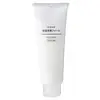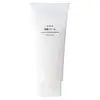What's inside
What's inside
 Benefits
Benefits

 Concerns
Concerns

 Ingredients Side-by-side
Ingredients Side-by-side

Water
Skin ConditioningGlycerin
HumectantMyristic Acid
CleansingLauric Acid
CleansingPotassium Hydroxide
BufferingPalmitic Acid
EmollientSodium Lauramido Diacetate
CleansingGlycol Distearate
EmollientSodium PEG-4 Cocamide Sulfate
CleansingGlyceryl Stearate Se
EmulsifyingSorbitan Stearate
EmulsifyingLauramide DEA
Polyquaternium-7
Etidronic Acid
Tetrasodium EDTA
Malt Juice
Skin ConditioningPolyquaternium-51
Skin ConditioningButylene Glycol
HumectantPrunus Persica Leaf Extract
EmollientWater, Glycerin, Myristic Acid, Lauric Acid, Potassium Hydroxide, Palmitic Acid, Sodium Lauramido Diacetate, Glycol Distearate, Sodium PEG-4 Cocamide Sulfate, Glyceryl Stearate Se, Sorbitan Stearate, Lauramide DEA, Polyquaternium-7, Etidronic Acid, Tetrasodium EDTA, Malt Juice, Polyquaternium-51, Butylene Glycol, Prunus Persica Leaf Extract
Water
Skin ConditioningMyristic Acid
CleansingButylene Glycol
HumectantStearic Acid
CleansingPotassium Hydroxide
BufferingGlycerin
HumectantPalmitic Acid
EmollientGlycol Distearate
EmollientLauric Acid
CleansingSodium Lauramido Diacetate
CleansingSodium/Mea-PEG-3 Cocamide Sulfate
CleansingCitrus Aurantium Dulcis Fruit Extract
MaskingOlea Europaea Fruit Oil
MaskingSorbitan Stearate
EmulsifyingLauramide DEA
 Reviews
Reviews

Ingredients Explained
These ingredients are found in both products.
Ingredients higher up in an ingredient list are typically present in a larger amount.
Butylene Glycol (or BG) is used within cosmetic products for a few different reasons:
Overall, Butylene Glycol is a safe and well-rounded ingredient that works well with other ingredients.
Though this ingredient works well with most skin types, some people with sensitive skin may experience a reaction such as allergic rashes, closed comedones, or itchiness.
Learn more about Butylene GlycolGlycerin is already naturally found in your skin. It helps moisturize and protect your skin.
A study from 2016 found glycerin to be more effective as a humectant than AHAs and hyaluronic acid.
As a humectant, it helps the skin stay hydrated by pulling moisture to your skin. The low molecular weight of glycerin allows it to pull moisture into the deeper layers of your skin.
Hydrated skin improves your skin barrier; Your skin barrier helps protect against irritants and bacteria.
Glycerin has also been found to have antimicrobial and antiviral properties. Due to these properties, glycerin is often used in wound and burn treatments.
In cosmetics, glycerin is usually derived from plants such as soybean or palm. However, it can also be sourced from animals, such as tallow or animal fat.
This ingredient is organic, colorless, odorless, and non-toxic.
Glycerin is the name for this ingredient in American English. British English uses Glycerol/Glycerine.
Learn more about GlycerinGlycol Distearate serves as a pearlizing or opacifying agent in cosmetic products.
It's often included in cleansers and haircare products to give them a lustrous or shimmering appearance.
It is derived from stearic acid, a natural fatty acid commonly found in vegetable oils and animal fats.
Glycol Distearate isn't fungal acne safe.
Learn more about Glycol DistearateWe don't have a description for Lauramide DEA yet.
Lauric Acid is a fatty acid or lipid. About half of fatty acids in coconut oil is lauric acid.
This ingredient helps hydrate and sooth skin. As a humectant, it helps trap moisture. It also aids in cleaning and enhancing the texture of products.
Lauric acid may not be Malassezia folliculitis, or fungal acne, safe.
Learn more about Lauric AcidMyristic Acid is a saturated fatty acid. It is naturally found in milk fat. Other sources include palm oil, coconut oil, and butter fat.
Myristic Acid is an emulsifer and cleanser. As an emulsifer, it stabilizes a product by preventing ingredients from separating. Myristic Acid helps clean your skin by acting as a surfactant. It tends to gather oil and dirt on your skin to be easily rinsed away.
One study from 2021 found Myristic Acid to have anti-inflammatory properties.
Learn more about Myristic AcidPalmitic Acid is a fatty acid naturally found in our skin and in many plant and animal sources. In cosmetics, it is usually derived from palm oil. It serves many purposes in skincare, acting as a cleanser, emollient, and emulsifier.
As an emollient, palmitic acid helps soften and smooth the skin by preventing water loss. In cleansers, it helps remove oil and dirt while creating foam.
Its emulsifying properties help stabilize products by keeping water and oil-based ingredients from separating.
This may not be suitable for fungal acne-prone skin, as fatty acids like this can sometimes trigger breakouts in sensitive individuals.
Learn more about Palmitic AcidPotassium hydroxide is commonly known as caustic potash. It is used to fix the pH of a product or as a cleaning agent in soap. In cleansers, it is used for the saponification of oils.
Sapnification is the process of creating fatty acid metal salts from triglycerides and a strong base. During this process, Potassium Hydroxide is used up and is not present in the final product.
Using high concentrations of Potassium Hydroxide have shown to irritate the skin.
Learn more about Potassium HydroxideWe don't have a description for Sodium Lauramido Diacetate yet.
Sorbitan Stearate comes from sorbitol and stearic acid. Sorbitol is a type of sugar and stearic acid is a fatty acid.
It is used as an emulsifier and helps ingredients stay together by creating water-in-oil emulsions.
This ingredient may not be Malassezia folliculitis, or fungal-acne safe.
Water. It's the most common cosmetic ingredient of all. You'll usually see it at the top of ingredient lists, meaning that it makes up the largest part of the product.
So why is it so popular? Water most often acts as a solvent - this means that it helps dissolve other ingredients into the formulation.
You'll also recognize water as that liquid we all need to stay alive. If you see this, drink a glass of water. Stay hydrated!
Learn more about Water